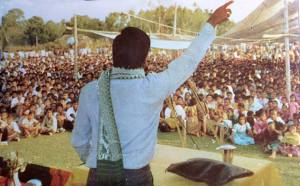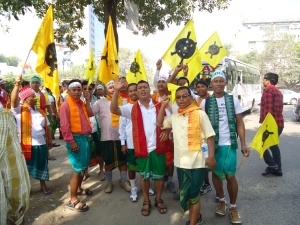This revolutionary essay “On Way to Revolution” was written by Upendra Nath Brahma before he launched the ABSU movement for a separate homeland on 2nd March 1987. The essay significantly reflects his intense desire to liberate the Bodo nation from the political entrapment of successive undemocratic Assam government, which continues to exploit the community socioeconomically, culturally, linguistically and politically even today. UN Brahma is today celebrated as “Bodofa,” meaning “Father of the Bodos” for championing the political dreams of the Bodos and wanted to formed a great Bodo nationality through creation of a separate homeland in India’s Northeast, a region down the foothills of the great Himalayas. This crucial revolutionary essay was transcribed, documented and curated by MONJIB MOCHAHARI on 19 July 2015.

On Way to Mass Revolution…
“THE BODOS and the other Mongolian tribes are the genuine aborigines in Assam as well as in Northeastern region of India. They are the sons of the soil whose historical belonging can’t be questioned. According some historians and scholars, Bodos settled down in Assam prior to 5000 B.C. They were once the rulers of entire Assam. They had kings and Kingdoms, the remains of which are still seen across Northeast and Koch Bihar in West Bengal. Bodos are the branch of the Mongolian groups of people spread across the South East Asian countries. And, linguistically they belong to the Tibbeto-Burman family, a language group spoken in more than a dozen countries in Asia.
The Ahoms, another Mongolian group of people invaded the Kachari kingdom in 1228 A.D. But then Kachari kingdom lasted till 1854 and after which it was annexed by British Emperialist forces. The last Kachari King was Tularam Senapati. Before the arrival of Ahom invadors in Assam, historically it is not known by what exact name this land was known. Obviously, it was not as Assam. So, the very name Assam came very late. By that time, most probably there was no such community or caste known as Assamese. As the name Assam did not exist, naturally the community Assamese also did not exist. Nor by that time such a concrete language existed. owever, it is generally agreed by historians that the ‘Assam’ is derived from a Boro word -“Hassam”, which means a large fertile plain landscape. It may not be improper if we say that Assamese language started in written form only from the time of Sankardeva in Brajabali, not even in the present form. The present Assamese language was derived from Sankrit, Uria, Bengali, Persi and Bodo languages. As such, neither the Assamese language nor Assamese community did exist in reality in the past. That is why one must be convinced that the Assamese language and community are nothing but artificially defined language and community which has no historical roots.
The renaissance of Bodos specifically began from the beginning of the Nineteenth century when the Bodo students began to grow. Later in many localities, different Bodo students’ unions were formed to accelerate social movements and reform the society. It was a period when our people were looked down by the Brahmin Assamese ruling elites as lower class. From the twenties onwards, Bodo Students’ Sonmilons or Unions came into concrete shapes. In 1965, the Goalpara District Bodo Students’ Union was formed. Two years later, the All Bodo Students’ Union (ABSU) was formed on 15th February 1967 at Kokrajhar Tribal Rest House.
The term Bodo did not mean Boros, but included in wider perspectives all Bodo groups of people linguistically. The terms is inclusive of all Bodo groups of communities such as – Boros, Dimasas, Rabhas, Garos, Sonowals, Deuris, Lalungs, Tripuris, Meches and those groups having close linguistics affinities with Bodos. The All Bodo Students’ Union (ABSU) had and still has the intention to unify and represent the scattered Bodos of the world under one roof.
In due course of renaissance of Bodos, the Bodo Sahitya Sabha (BSS) was formed on 16 November 1952 during a meeting held at Ranchaidham near Basugaon in the present Kokrajhar district. Subsequently, both BSS and Bodo students strived for protection and promotion of distinct Bodo language and its introduction as a medium of instruction in Primary, Middle and Secondary stages of education in Assam.
Resulting from uttern neglected and discrimination by the ruling elites, an intense feeling of insecurity grew in the minds of the Bodos during this period. And, Bodos needed another a secured political alterative arrangement to liberate from the onslaught of Assamese chauvanism, which became a lethal threat to the indigenous people of the state. Indigenous tribes were already losing their rich language, culture and traditions. And, political dream was outside their reach. By then, the then Prime Minister Indira Gandhi, had declared on 13 January 1967 that Assam would be reorganised on federal structure. The Bodo community, a largest tribal group in entire Northeast welcomed the decision of the Prime Minister warmly. Particularly ABSU welcomed it seriously and immediately demanded that the Assam state should be reorganised and a separate state be given to the Plains Tribals. On the basis of such idea, a political party, Plains Tribal Council of Assam (PTCA) was formed on 27 February 1967 at Kokrajhar. Since the inception of PTCA, the ABSU has been supporting the PTCA in the demand for a separate tribal state till 1977. Unfortunately, the PTCA leaders couldn’t sustain their movement but later abandoned it completely as they were coopted by Assamese political class. The ABSU withdrew its support to PTCA as its leaders belied the genuine political aspirations of thousands of plain tribal people spread across the state.
The PTCA leadership took the most opportunistic and professional politician’s role and played the politics of falsehood. Even today, their politics is nothing but only based on falsehood. The ABSU is having not only the demand of separate state with the status of Union Territory in the Northern bank of River Brahmaputra of Assam, but also having the demands of extension of provisions of the Sixth Schedule of Indian Constitution in the tribal compact areas in the Southern valley of the Brahmaputra and inclusion of Bodo-Kacharis of Karbi Anglong in the Sixth Schedule or the creation of Regional Council for the Non-Karbi tribes such as Bodos, Rengma Nagas, etc living in Karbi Anglong Autonomous District Council and other genuine demands. Including aforementioned demands, the ABSU has submitted 92-point Memorandum to the Chief Minister of Assam on 1 January 1987 and to Governor of Assam on 10 January 1987. The Union also submitted 25 point memorandum to the Prime Minister of India, Home Minister and President of India in New Delhi on 22, 24 and 30 January 1987, respectively. ABSU is now preparing to launch a mass movement from 2nd March 1987.
What makes the ABSU to start the mass movement is very much obvious. No government whether it be the State or the Central government paid slightest heed to grievances and demands of the ABSU in particular and Bodos and other tribal communities in general, who continues to remain on the periphery of underdevelopment. No government cared the Bodos nor tried to fulfil their demands. Bodos are the most neglected, discriminated people in Assam as well as India. The State administration is very biased, anti-Tribal and is hatching a deep-rooted conspiracy against the interests of the tribal communities.
The State government might use brutal police forces to crush down the Bodo uprising, where the question of human rights and civil liberties will arise in international forum. But whatsoever eventualities would come, the Bodos are resolutely determined to face and achieve their cherished political goals. They days of revolution and mass upsurge are coming and there will be a dark period for the Bodos and after darkness dawn shall come surely and certainly. Victory shall come to us and to Bodos. Bodos of the world – Unite. Long live –Bodos. Welcome Revolution.”
Note: Unauthorised copying is strictly prohibited.


